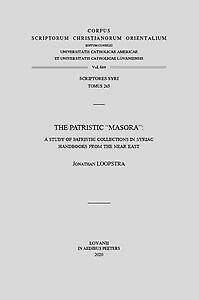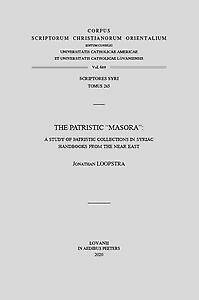
Je cadeautjes zeker op tijd in huis hebben voor de feestdagen? Kom langs in onze winkels en vind het perfecte geschenk!
- Afhalen na 1 uur in een winkel met voorraad
- Gratis thuislevering in België vanaf € 30
- Ruim aanbod met 7 miljoen producten
Je cadeautjes zeker op tijd in huis hebben voor de feestdagen? Kom langs in onze winkels en vind het perfecte geschenk!
- Afhalen na 1 uur in een winkel met voorraad
- Gratis thuislevering in België vanaf € 30
- Ruim aanbod met 7 miljoen producten
Zoeken
The Patristic 'Masora
A Study of Patristic Collections in Syriac Handbooks from the Near East
J Loopstra
€ 266,45
+ 532 punten
Omschrijving
Though fairly distinct among Syriac manuscripts, the nearly twenty exemplars of the so-called Syriac "Masora" remain relatively unknown and often misunderstood. These handbooks were developed to help the reader pronounce, interpret, and compare words from across a spectrum of different sources: including works of patristics, theology, liturgy, and the Bible. Because earlier studies of this genre have focused, almost exclusively, on the biblical portions of these manuscripts, little has been known about the collections of excerpts from 255 patristic-era writings included in many of these handbooks. This volume is the first-ever study and transcription of over ten thousand excerpted 'vocalized words and readings' (smohē w-qroyoto) from works attributed to Greek writers such as Ps.-Dionysius, Basil, Gregory of Nazianzus, and Severus of Antioch. This material has the potential to inform not only Syriac studies and Patristics, but the broader study of literacy and modes of learning in the Medieval Middle East.
Specificaties
Betrokkenen
- Auteur(s):
- Uitgeverij:
Inhoud
- Aantal bladzijden:
- 472
- Taal:
- Engels
- Reeks:
- Reeksnummer:
- nr. 689
Eigenschappen
- Productcode (EAN):
- 9789042942332
- Verschijningsdatum:
- 13/10/2020
- Uitvoering:
- Paperback
- Formaat:
- Trade paperback (VS)
- Afmetingen:
- 160 mm x 240 mm
- Gewicht:
- 725 g

Alleen bij Standaard Boekhandel
+ 532 punten op je klantenkaart van Standaard Boekhandel
Beoordelingen
We publiceren alleen reviews die voldoen aan de voorwaarden voor reviews. Bekijk onze voorwaarden voor reviews.









